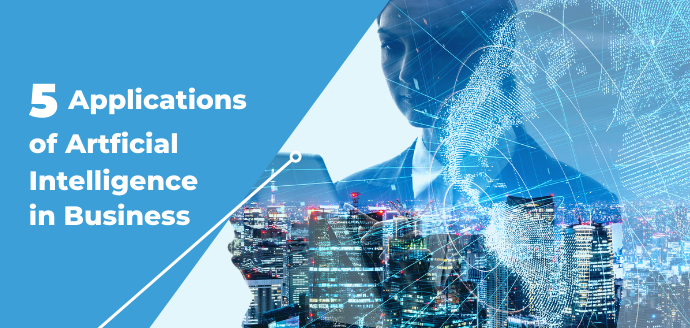
06 May 5 Applications of Artificial Intelligence in Business
According to the Global AI Adoption Index 2021 report, conducted by Morning Consult on behalf of IBM, the use of artificial intelligence within companies is showing signs of acceleration.
In recent years, the rate of AI adoption was nearly flat. Today, on the contrary, investments by one third of the businesses interviewed are expected. The businesses concerned state that they want to invest in AI skills and solutions in the next 12 months.
As mentioned in the report, the main areas in which companies (included in the report) apply artificial intelligence are as follows:
- data security
- process automation
- customer care service
Business executives, IT managers, analysts and experts in artificial intelligence declare that AI can:
- significantly reduce costs
- increase efficiency and productivity
- create avenues to new products, services and markets.
You’ll find below a description of five fields of application of artificial intelligence. In addition, we will present the benefits that it can contribute to business.
1. Artificial intelligence for the customer experience
According to research released by Oracle, the large-scale deployment of digital, mobile and social networking platforms has transformed consumer behaviour. Consumers are in fact developing a growing preference for a “self-service” approach towards their interactions with brands. It seems obvious that meeting this new demand is necessary, as is creating novel modalities of interaction, engagement and loyalty-building with users.
And it’s in this area where artificial intelligence comes into play: chatbots, for example, use both machine learning algorithms and NLPs to understand the requests of customers and respond appropriately. Furthermore, AI powers recommendation functions. Through customer data and predictive analysis, AI suggests products that customers need or wish to purchase.
2. Artificial intelligence for the supply chain
AI can be used by companies in every industry to improve the management of their supply chains. It’s possible to employ machine learning in order to predict what will be needed and when it will be needed as well as the optimal time to move supplies.
In this particular example of application, AI helps create more efficient and affordable supply chains. It also enables you to minimise or even eliminate excess stock, thereby avoiding the risk of being short of products in demand.
3. Artificial intelligence for quality control
Manufacturers have been using artificial vision for a long time. Currently, manufacturers are enhancing this artificial vision by adopting AI software based on deep learning in order to improve the speed and accuracy of their quality control functions while keeping costs low.
These systems provide a quality control function that is more precise and in continual development. The deep learning models create rules to determine what defines quality and they do so with a higher level of precision.
4. Artificial intelligence for fraud detection
The financial services industry utilises artificial intelligence and machine learning for fraud detection and for online and data security. AI software programs analyse both historical data and real-time data for the purpose of determining the legitimacy of individual transactions. Financial services firms also use AI for estate management, loan approvals and decisions on trading.
5. Artificial intelligence for the optimisation of business functions
The optimisation of business functions is another example of AI use that extends across various sectors. The business applications based on artificial intelligence can employ algorithms to transform data into practical information on how organisations are able to refine a series of business functions and processes, from the timetabling of workers to the pricing of products.




